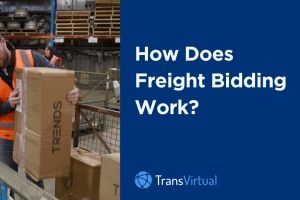Table of Contents
Nothing strikes fear into the heart of a mild-mannered transportation professional like freight bidding season.
And we get it: freight bidding can often be a complex, stressful, and unsatisfying process for everyone involved.
But the great news is that it doesn’t have to be that way. Freight bidding can be a productive and even enjoyable process in which everyone comes out a winner.
Today, we’re breaking down everything you need to know about freight bidding: what it is, how it works, and a few tips about how you can get the best deal at competitive rates. Freight Management is complicated, see how we can simplify your business.
What is Freight Bidding?
Freight Bidding is a process by which a shipper can initiate or renew their business relationship with a carrier by submitting a proposal.
These proposals can be submitted both to carriers that the shipper has an existing relationship with, called an incumbent carrier, and prospective carriers. Existing contracts play a crucial role here, as they allow shippers to fulfill their shipping requirements using pre-defined agreements with multiple vendors, providing stability and predictability.
Essentially, the shipper creates a pitch or ‘bid’ that outlines the relationship they would like to have with the carrier, and some preliminary terms of that relationship. If the carrier is interested, they move into a phase of negotiation.
How Does the Freight Bidding Process Work?
The term ‘bidding’ conjures up images of a marketplace of auction, which is a pretty good metaphor for the freight bidding process.
As we know, a freight bid is when a shipper drafts up and sends a proposal (called an RFP) to carriers they are interested in working with. The proposal puts forward a rough overview of the terms of the relationship they would like to initiate with a particular carrier. The carrier then looks over these proposals and either rejects them or enters into further negotiation with the shipper.
A freight broker, also known as a freight forwarder, acts as an intermediary between shippers and carriers, actively searching for the best deals and bidding on them to secure spots for shippers and ensure carriers get the highest freight. Each successful bid generates a commission for the freight broker, often calculated based on the total freight value.
All of this usually occurs during freight bidding ‘season’, around the end of the financial year, when companies are examining their bottom lines and contracts are running out en masse.
What makes the process difficult and stressful for many professionals is that bids need to balance the interests of the shipper with the carrier and come up with a plan that is mutually beneficial. This is compounded by the fact that carriers are often inundated with thousands upon thousands of RFPs during bidding season, making it harder for more conservative offers to stand out in the rat race.

Pros: Freight Bidding
Freight bidding is the market’s solution to keeping freight rates manageable and advantageous for all involved. Here are a couple of reasons why we like the process:
Freight bidding can also help secure better shipping services by leveraging increased demand to improve pricing, bargaining power, and logistics outsourcing for carriers or shipping companies.
Mutually Beneficial
Ideally, freight bidding is a way to open up a dialogue and come to a mutually beneficial agreement between the two parties by addressing their shipping requirements. Through this, both shippers and carriers can meet their individual needs.
Encourages Competition
The practice of freight bidding encourages friendly competition between both shippers and carriers, which helps mitigate price gouging and allows both parties the opportunity to seek out the most beneficial deals and partnerships.
Freight brokers play a crucial role in this process by acting as a bridge between shippers and carriers, finding the best deals and bidding on them to secure spots for shippers and ensure carriers get the highest freight.
Cons: Freight Bidding
However, changes in the freight industry over time have upset the balance between shippers and carriers, leading to issues with inequitable bargaining power and staff becoming overwhelmed.
These disadvantages can significantly impact supply chain operations, affecting cost savings, efficiency, and overall logistics strategy.
Lost In the Rush
Freight bidding has become a frantic and disorganised process for many in the industry. Many offers simply get lost in the shuffle as more and more RFPs land on the desks of major carriers, which can leave many in the lurch. Shipping companies are significantly impacted by this rush, facing challenges in managing the influx of bids and maintaining efficiency.
Bargaining Power Imbalance
With carriers so overwhelmed by bids, there can be a power imbalance created between the shipper and the carrier – meaning that shippers can find it increasingly hard to find a strategically valuable deal.
As the demand for carriers multiplies, smaller shippers can find they simply do not have the bargaining power to secure themselves an advantageous position. More and more shippers find that their contracted rates fall below market rates – driving up the freight rates en masse over time.
3 Tips to Bid Effectively
Bidding is definitely an art form, and you need to write your sales proposal with the carrier’s interests in mind. If you’re looking to create a strong and attractive RFP, then these tips are for you.
Remember that a good understanding of supply chain management is crucial for effective bidding, as it helps in optimising logistics operations and reducing costs.
Know The Market
Research is key to making an attractive bid that won’t bankrupt you along the way. The most important thing to research is your competitors’ offers and bidding strategies, which should give you an idea of both the industry standard and how you can distinguish yourself.
It’s also important to understand the carrier’s interests and margins (it’s time to go rifling through those annual reports). By understanding a carrier’s bottom line, you avoid creating proposals that are incompatible with their business goals and are immediately rejected.
Know Your Edge
It’s unlikely that you’re going to have the cash to offer a bid that carriers can’t refuse, but most businesses have an edge or distinction that you can highlight to make your business stand out. Many carriers seek to diversify the type of freight they carry so as to withstand market fluctuations, or are interested in monopolising specialised services – so make sure you lead with what makes your business unique.
Stay Flexible
We mean this one in two ways.
Firstly, it’s good to keep in mind that your bid is subject to change during the negotiation process, so it can be valuable to enter into discussion even when the carrier’s counter offer is less than ideal.
Secondly, don’t get too set on the carrier you want, even if they’re a long term partner. The freight industry changes at a fast pace, and digging your heels in can cause you to miss out on a great deal elsewhere.
Final Thoughts
Freight bidding has the potential to let both shippers and carriers come away with a good deal.
Explore our blogs to find out more about solving complexities in the freight and transport industry, or talk to our team to see how TransVirtual can help your business move faster.



